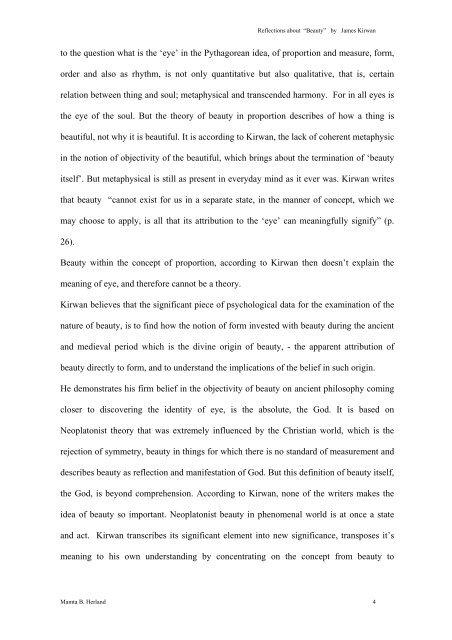Reflections about “Beauty” James Kirwan - Mamtaart.com - Mamta Art
Reflections about “Beauty” James Kirwan - Mamtaart.com - Mamta Art
Reflections about “Beauty” James Kirwan - Mamtaart.com - Mamta Art
Create successful ePaper yourself
Turn your PDF publications into a flip-book with our unique Google optimized e-Paper software.
<strong>Reflections</strong> <strong>about</strong> <strong>“Beauty”</strong> by <strong>James</strong> <strong>Kirwan</strong><br />
to the question what is the ‘eye’ in the Pythagorean idea, of proportion and measure, form,<br />
order and also as rhythm, is not only quantitative but also qualitative, that is, certain<br />
relation between thing and soul; metaphysical and transcended harmony. For in all eyes is<br />
the eye of the soul. But the theory of beauty in proportion describes of how a thing is<br />
beautiful, not why it is beautiful. It is according to <strong>Kirwan</strong>, the lack of coherent metaphysic<br />
in the notion of objectivity of the beautiful, which brings <strong>about</strong> the termination of ‘beauty<br />
itself’. But metaphysical is still as present in everyday mind as it ever was. <strong>Kirwan</strong> writes<br />
that beauty “cannot exist for us in a separate state, in the manner of concept, which we<br />
may choose to apply, is all that its attribution to the ‘eye’ can meaningfully signify” (p.<br />
26).<br />
Beauty within the concept of proportion, according to <strong>Kirwan</strong> then doesn’t explain the<br />
meaning of eye, and therefore cannot be a theory.<br />
<strong>Kirwan</strong> believes that the significant piece of psychological data for the examination of the<br />
nature of beauty, is to find how the notion of form invested with beauty during the ancient<br />
and medieval period which is the divine origin of beauty, - the apparent attribution of<br />
beauty directly to form, and to understand the implications of the belief in such origin.<br />
He demonstrates his firm belief in the objectivity of beauty on ancient philosophy <strong>com</strong>ing<br />
closer to discovering the identity of eye, is the absolute, the God. It is based on<br />
Neoplatonist theory that was extremely influenced by the Christian world, which is the<br />
rejection of symmetry, beauty in things for which there is no standard of measurement and<br />
describes beauty as reflection and manifestation of God. But this definition of beauty itself,<br />
the God, is beyond <strong>com</strong>prehension. According to <strong>Kirwan</strong>, none of the writers makes the<br />
idea of beauty so important. Neoplatonist beauty in phenomenal world is at once a state<br />
and act. <strong>Kirwan</strong> transcribes its significant element into new significance, transposes it’s<br />
meaning to his own understanding by concentrating on the concept from beauty to<br />
<strong>Mamta</strong> B. Herland 4


